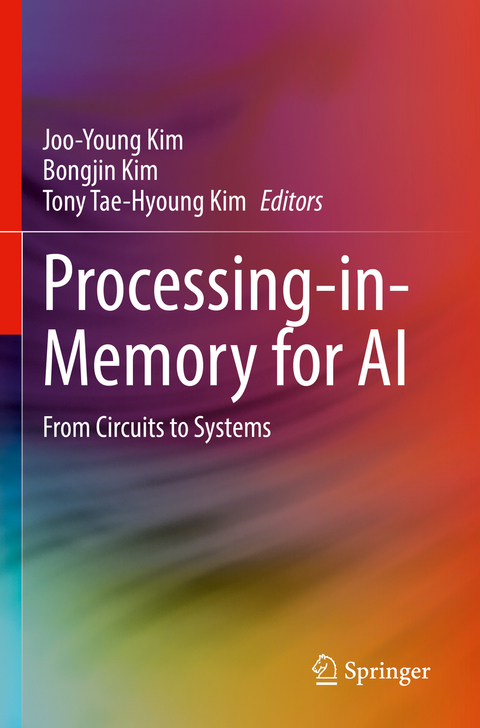
Processing-in-Memory for AI
Springer International Publishing (Verlag)
978-3-030-98783-1 (ISBN)
lt;p>Joo-Young Kim received the B.S., M.S., and Ph. D degree in Electrical Engineering from Korea Advanced Institute of Science and Technology (KAIST), Daejeon, South Korea, in 2005, 2007, and 2010, respectively. He is currently an Assistant Professor in the School of Electrical Engineering at KAIST. He is also the Director of AI Semiconductor Systems (AISS) research center. His research interests span various aspects of hardware design including VLSI design, computer architecture, FPGA, domain-specific accelerators, hardware/software co-design, and agile hardware development. Before joining KAIST, he was a Senior Hardware Engineering Lead at Microsoft Azure, Redmond, WA, USA, working on hardware acceleration for its hyper-scale big data analytics platform named Azure Data Lake. Before that, he was one of the initial members of Catapult project at Microsoft Research, Redmond, WA, USA, where he deployed a fabric of FPGAs in datacenters to accelerate critical cloud services, such as machine learning, data storage, and networking.
Dr. Kim is a recipient of the 2016 IEEE Micro Top Picks Award, the 2014 IEEE Micro Top Picks Award, the 2010 DAC/ISSCC Student Design Contest Award, the 2008 DAC/ISSCC Student Design Contest Award, and the 2006 A-SSCC Student Design Contest Award. He serves as Associate Editor for the IEEE Transactions on Circuits and Systems I: Regular Papers (2020-2021).
Bongjin Kim received BS and MS degrees from Pohang University of Science and Technology (POSTECH), Pohang, Korea, in 2004 and 2006, respectively and PhD degree from University of Minnesota, Minneapolis, MN, USA in 2014. After PhD, He worked on design techniques and methodologies for communication circuits and microarchitectures at Rambus and Stanford University as a senior staff and a postdoctoral research fellow. After working as an assistant professor at Nanyang Technological University in Singapore for three years (from 2017 to 2020), he joined Department of Electrical and Computer Engineering (ECE) at University of California, Santa Barbara.
From 2006 to 2010, he was with System LSI, Samsung Electronics, Yongin, South Korea. In 2012, he joined Wireless Business, Texas Instruments, Dallas, TX, USA as a SRC Summer Intern. He also joined Mixed-Signal Communication IC Design Group, IBM T.J. Watson Research Center as a Research Summer Intern in 2013. He was an Engineering Intern and a senior technical staff in Memory and Interface Division, Rambus Inc., Sunnyvale, CA, USA, from 2014 to 2016. Prof. Kim is the recipient of a Doctoral Dissertation Fellowship Award, a ISLPED Low Power Design Contest Award and an Intel/IBM/Catalyst Foundation CICC Student Award. His research works appeared in top circuit conferences and journals including ISSCC, VLSI symposium, CICC and JSSC. His current research focuses on memory-centric computing circuits/architecture using embedded memories for artificial intelligence, machine learning, and alternative computing solutions for solving combinatorial optimization problems.
Tony Tae-Hyoung Kim received the B.S. and M.S. degrees in electrical engineering from Korea University, Seoul, Korea, in 1999 and 2001, respectively. He received the Ph.D. degree in electrical and computer engineering from the University of Minnesota, Minneapolis, MN, USA in 2009. From 2001 to 2005, he worked for Samsung Electronics where he performed research on the design of high-speed SRAM memories, clock generators, and IO interface circuits. In 2007 ~ 2009 summer, he was with IBM T. J. Watson Research Center and Broadcom Corporation where he performed research on isolated NBTI/PBTI measurement circuits and SRAM mismatch measurement test structure, and battery backed memory design, respectively. In November 2009, he joined Nanyang Technological University where he is currently an associate professor. His current research interests include low power and high performance digital, mixed-mode, and memory circuit
Introduction.- Background.- PIM Constraints and Approaches.- SRAM based PIM.- DRAM based PIM.- ReRAM based PIM.- PIM for AI Training.- PIM Systems.- Conclusion.
| Erscheinungsdatum | 11.07.2023 |
|---|---|
| Zusatzinfo | V, 165 p. 134 illus., 99 illus. in color. |
| Verlagsort | Cham |
| Sprache | englisch |
| Maße | 155 x 235 mm |
| Gewicht | 278 g |
| Themenwelt | Informatik ► Theorie / Studium ► Künstliche Intelligenz / Robotik |
| Technik ► Elektrotechnik / Energietechnik | |
| Schlagworte | AI and Big Data • DRAM-based processing in memory • In-memory Architectures for Machine Learning • Processing in memory for AI training • ReRAM-based processing in memory • Software stack for processing in memory • SRAM-based processing in memory |
| ISBN-10 | 3-030-98783-3 / 3030987833 |
| ISBN-13 | 978-3-030-98783-1 / 9783030987831 |
| Zustand | Neuware |
| Haben Sie eine Frage zum Produkt? |
aus dem Bereich


